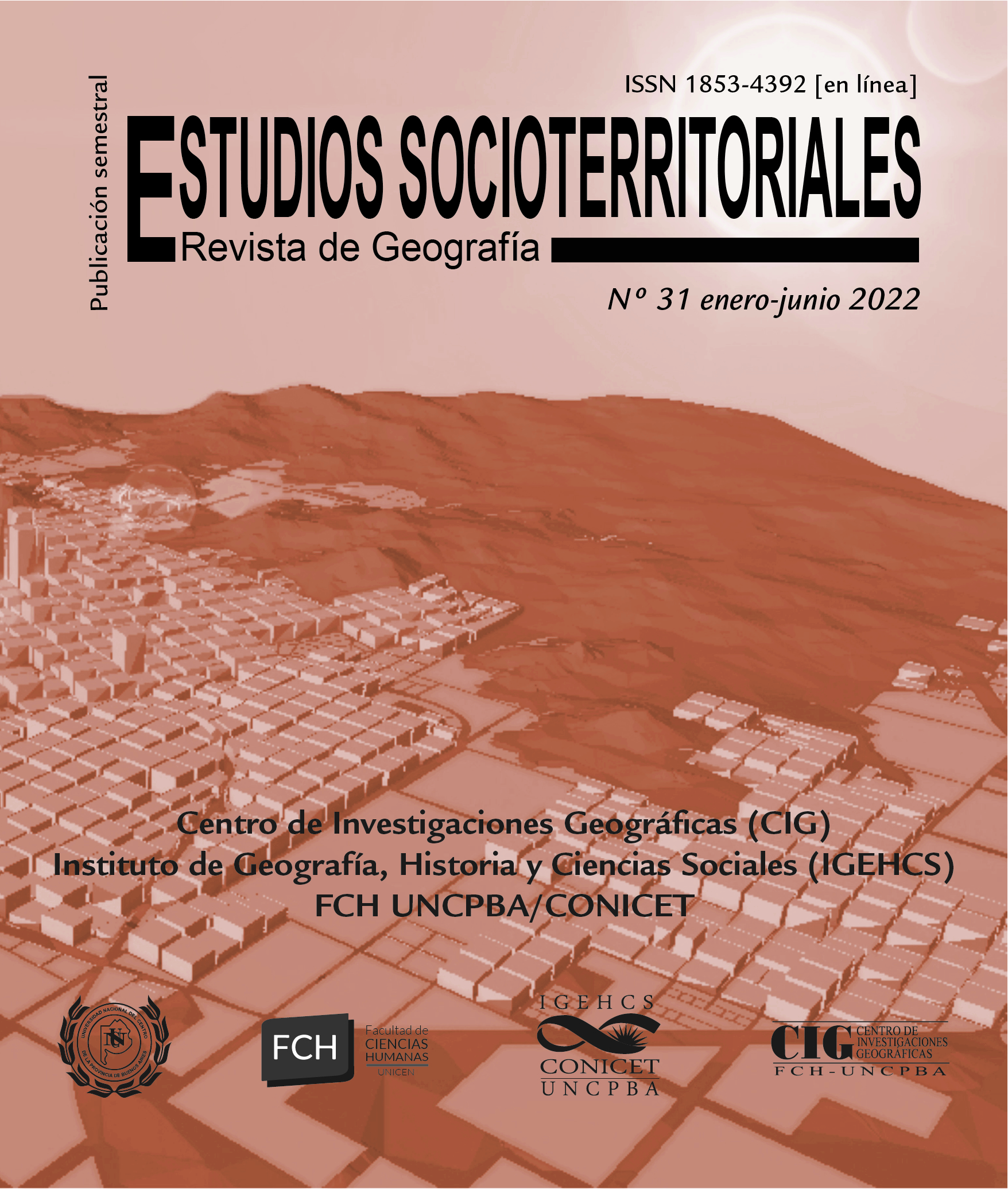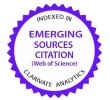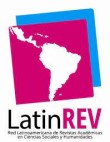Aprendizaje social y participación territorial en una zona rural costera
DOI:
https://doi.org/10.37838/unicen/est.31-212Palabras clave:
Zona rural costera; Aprendizaje social; Acción colectiva; Autonomía territorialResumen
Este estudio se realizó en una zona rural costera: la Costa Chica del Estado de Guerrero, México, con el objetivo de poner en marcha un proceso de aprendizaje social orientado a ampliar la capacidad de acción colectiva de un grupo de actores interesados en gestionar dicho territorio con una visión autónoma de bienestar. El grupo mencionado estuvo integrado por 26 miembros y se constituyó por funcionarios y por representantes ganaderos, agrícolas y pescadores. El aprendizaje social se realizó sobre tres campos de formación territorial: sentido del lugar, percepción del paisaje y articulación de los actores interesados. Los resultados indicaron que la percepción del paisaje se puede beneficiar ampliamente del aprendizaje social y que la formación del sentido del lugar presenta mayores retos. También se destaca el importante papel que juega la mediación o facilitación para orientar procesos intencionales de aprendizaje social.
Métricas
Citas
Armitage, D.; Berkes, F.; Dale, A.; Kocho-Schellenberg, E. y Patton, E. (2011). Co-management and the co-production of knowledge: Learning to
adapt in Canada’s Arctic. Global environmental change, 21(3), 995-1004.
Barnes, M. L.; Mbaru, E. y Muthiga, N. (2019). Information access and knowledge exchange in co-managed coral reef fisheries. Biological
Conservation, 238, 108198.
Beers, P. J.; Van Mierlo, B. y Hoes, A. C. (2016). Toward an integrative perspective on social learning in system innovation initiatives. Ecology
and Society, 21(1), 33
Blackmore, C. (2010). Managing systemic change: future roles for social learning systems and communities of practice? En C. Blackmore (ed),
Social learning systems and communities of practice (pp. 201-218). London: Springer.
Bryan, J. (2012). Rethinking territory: Social justice and neoliberalism in Latin America’s territorial turn. Geography Compass, 6(4), 215–226.
Cundill, G. y Rodela, R. (2012). A review of assertions about the processes and outcomes of social learning in natural resource management.
Journal of environmental management, 113, 7-14.
Drenthen, M. (2011). Reading ourselves through the land: landscape hermeneutics and ethics of place’. En F. Clingerman y M. Dixon (eds.),
Placing Nature on the Borders of Religion, Philosophy, and Ethics (pp 123–138). Farnham, Ashgate.
Ernst, A. (2019a). Review of factors influencing social learning within participatory environmental governance. Ecology and society, 24(1), 3.
Ernst, A. (2019b). Research techniques and methodologies to assess social learning in participatory environmental governance. Learning,
Culture and Social Interaction, 23, 100331.
Escobar, A. (2004). Más allá del Tercer Mundo: Globalidad imperial, colonialidad global y movimientos sociales anti-globalización. Nómadas,
(20), 86-100.
Frank, A. S. y Schäffler, L. (2019). Identifying key knowledge gaps to better protect biodiversity and simultaneously secure livelihoods in a
priority conservation area. Sustainability, 11(20), 5695.
Halvorsen, S. (2019). Decolonising territory: Dialogues with Latin American knowledges and grassroots strategies. Progress in Human
Geography, 43(5), 790-814.
Harcourt, W. y Escobar, A. (2002). Women and the Politics of Place. Development, 45(1), 7-14.
Herrera, O. B.; Parra, M.; Livscovsky, I.; Ramos, P. y Gallardo, D. (2019). Lifeways and territorial innovation: values and practices for promoting
collective appropriation of territory. Community Development Journal, 54(3), 427-445.
Heyes, C. (2016). Who knows? Metacognitive social learning strategies. Trends in cognitive sciences, 20(3), 204-213.
Instituto Nacional de Estadística y Geografía INEGI (2020). Censo de población y vivienda 2020.
https://www.inegi.org.mx/programas/ccpv/2020/
Kaiser, D. B.; Gaasch, N. y Weith, T. (2017). Co-production of knowledge: A conceptual approach for integrative knowledge management in
planning. Transactions of the Association of European Schools of Planning, 1(1), 18-32.
Kärrholm, M. (2017). The temporality of territorial production: the case of Stortorget, Malmö. Social & Cultural Geography, 18(5), 683-705.
Leys, A. J. y Vanclay, J. K. (2011). Social learning: A knowledge and capacity building approach for adaptive co-management of contested
landscapes. Land use policy, 28(3), 574-584.
Liu, J.; Hull, V.; Godfray, H. C. J.; Tilman, D.; Gleick, P.; Hoff, H.; Pahl-Wostl, C.; Xu, Z.; Chung, M. G.; Sun, J. y Li, S. (2018). Nexus approaches to
global sustainable development. Nat. Sustain, 1, 466–476.
Mason-Deese, L.; Habermehl, V. y Clare, N. (2019). Producing territory: territorial organizing of movements in Buenos Aires. Geographica
Helvetica, 74(2), 153-161.
Masterson, V. A.; Stedman, R. C.; Enqvist, J.; Tengö, M.; Giusti, M.; Wahl, D. y Svedin, U. (2017). The contribution of sense of place to social-
ecological systems research: a review and research agenda. Ecology and Society, 22(1), 49.
Moreau, C.; Barnaud, C. y Mathevet, R. (2019). Conciliate agriculture with landscape and biodiversity conservation: a role-playing game to
explore trade-offs among ecosystem services through social learning. Sustainability, 11(2), 310.
Muro, M. y Jeffrey, P. (2008). A critical review of the theory and application of social learning in participatory natural resource management
processes. Journal of Environment Planning and Management, 51(3), 325-344.
Ostrom, E. (2000). Collective action and the evolution of social norms. Journal of economic perspectives, 14(3), 137-158.
Pahl‐Wostl, C. y Hare, M. (2004). Processes of social learning in integrated resources management. Journal of community & applied social
psychology, 14(3), 193-206.
Penghui, J.; Manchun, L. y Liang, C. (2020). Dynamic response of agricultural productivity to landscape structure changes and its policy
implications of Chinese farmland conservation. Resources, Conservation and Recycling, 156, 104724.
Quecha, R. C. (2015). La movilización etnopolítica afrodescendiente en México y el patrimonio cultural inmaterial. Anales de Antropología,
(2), 149-173.
Raymond, C. M.; Kyttä, M. y Stedman, R. (2017). Sense of place, fast and slow: the potential contributions of affordance theory to sense of
place. Frontiers in psychology, 8, 1674.
Raymond, C. M. y Cleary, J. (2013). A tool and process that facilitate community capacity building and social learning for natural resource
management. Ecology and Society, 18(1), 25.
Rodríguez S. C.; Lorenzo Q. O. y Herrera T. L. (2005). Teoría y práctica del análisis de datos cualitativos. Proceso general y criterios de calidad.
Revista Internacional de Ciencias Sociales y Humanidades, XV(2), 133-154.
Saavedra Gallo, G. (2017). Territorio, diferencia y producción de alimentos. Los retos de la acción colectiva en espacios económicos localizados
de Latinoamérica. Estudios Latinoamericános, (40), 59-74.
Santos, Boaventura de Sousa (2002). Towards a New Legal Common Sense. London: Butterworth.
Saunders, F.; Mohammed, S.M.; Jiddawi, N.; Nordin, K.; Lunden, B. y Sjoling, S. (2010).The changing social relations of a community-based
mangrove forest Project in Zanzibar. Ocean and Coastal Management, 53(4), 150-160.
Schusler, T. M.; Decker, D. J. y Pfeffer, M. J. (2003). Social learning for collaborative natural resource management. Society & natural resources,
(4), 309-326.
Smaldone, D.; Harris, C. y Sanyal, N. (2008). The role of time in developing place meanings. Journal of Leisure Research, 40(4), 479–504.
Schneider, F.; Giger, M.; Harari, N.; Moser, S.; Oberlack, C.; Providoli, I.; Schmid, L.; Tribaldos, T. y Zimmermann, A. (2019). Transdisciplinary co-
production of knowledge and sustainability transformations: Three generic mechanisms of impact generation. Environmental science &
policy, 102, 26-35.
Suškevičs, M.; Hahn, T.; Rodela, R.; Macura, B. y Pahl-Wostl, C. (2018). Learning for social-ecological change: a qualitative review of outcomes
across empirical literature in natural resource management. Journal of environmental planning and management, 61(7), 1085-1112.
Tippett, J.; Searle, B.; Pahl-Wostl, C. y Rees, Y. (2005). Social learning in public participation in river basin management—early findings from
HarmoniCOP European case studies. Environmental science & policy, 8(3), 287-299.
Tomich, D. y Luna, P. M. (2018). La segunda esclavitud y el capitalismo mundial: una perspectiva para la investigación histórica. Historia Social,
, 149-164.
Tyler, S. R. (2008). Adaptive learning in natural resource management: three approaches to research. Rural Poverty and Environment Working
Paper, 22.
Van Bommel, S.; Röling, N.; Aarts, N. y Turnhout, E. (2009). Social learning for solving complex problems: a promising solution or wishful
thinking? A case study of multi‐actor negotiation for the integrated management and sustainable use of the Drentsche Aa area in the
Netherlands. Environmental Policy and Governance, 19(6), 400-412.
Descargas
Publicado
Cómo citar
Número
Sección
Licencia

Esta obra está bajo una licencia internacional Creative Commons Atribución-NoComercial-CompartirIgual 4.0.
 Este trabajo se encuentra registrado bajo una licencia Creative Commons Atribución – No Comercial – Compartir Igual (by-nc-sa).
Este trabajo se encuentra registrado bajo una licencia Creative Commons Atribución – No Comercial – Compartir Igual (by-nc-sa).
Esta licencia permite compartir, copiar y redistribuir el material en cualquier medio o formato. Adaptar, remezclar, transformar y crear a partir del material otra obra, siempre citando la autoría y la fuente original de su publicación (revista, editorial y URL de la obra), no se utilicen para fines comerciales y se mantengan los mismos términos de la licencia.













